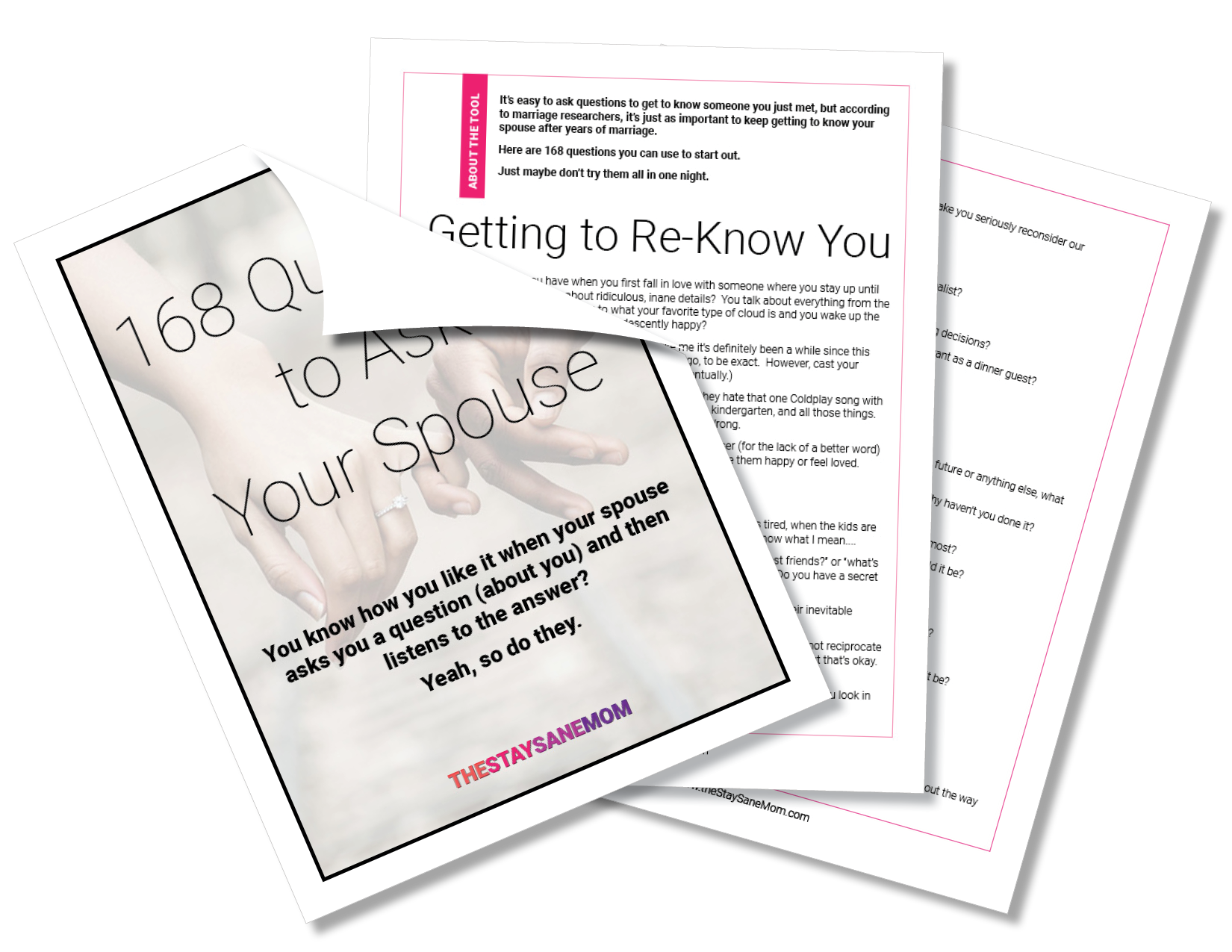Can You Predict which Couples Get Divorced?

Can You Predict which Couples Get Divorced?
What makes a marriage last (or not)? How can I make my marriage happier? There's a lot of opinions out there but not a lot of hard facts. Learn what the research has shown to actually predict which marriages stay together and which ones end in divorce.
Written by Liz Bayardelle, PhD | See Comments | Updated 11/15/2018
Want to cut to the chase?
168 Questions to Ask Your Spouse

Want to cut to the chase?
168 Questions to Ask Your Spouse
Get the Free Printable PDF Now
Get it NowCan You Predict which Couples Get Divorced?
This post contains some affiliate links for your convenience. Click here to read my full disclosure policy.
What would you say if I told you I could predict whether you would stay married or get divorced with 94% accuracy?
Well, no shoot Sherlock, I'm not a crystal ball, so you'd say I was crazy or selling something (I am neither of the two, FYI).
However, in a series of "divorce prediction" studies, psychologist Dr. John Gottman was able to successfully predict which couples in his study would stay together and which would get divorced, with 93.6% accuracy.
This article will go over the "four horsemen of divorce", one of the basic principles of the Gottman Method, why it's so well-known, and (most importantly) how it can help your marriage.
Where did the Gottman Method come from?
In the early 1970's, a psychologist named Dr. John Gottman started doing observational research on the behavioral differences between happy and unhappy couples.
Now, when I say "observational research", I'm not joking around. He literally trapped (well, with their consent) couples in a room full of unobtrusive cameras for a weekend and coded their behaviors, interactions, and even their facial expressions down to the second.
Previously therapists had said it was stupid to study individual couples (because all couples are so different, etc.), but Gottman studied a huge number of couples, got incredibly significant results, and went on to do some of the most widely-known marriage research in existence.
And this can actually predict divorce?
Short answer: Yes.
One of the Gottman studies predicted whether couples would get divorced with 93.6% accuracy. Numbers are the way to my heart, so this was all I needed to hear to become interested.
In this article I'll be talking about the "four horsemen" of the apocalypse. (We'll cover the seven principles for making marriage work in later blogs.) However, this cliff notes version does not excuse you from doing more reading on the topic.
*pulls librarian glasses down bridge of nose and gives you a stern look*
It's incredibly interesting stuff and there's no way to go over everything here. I will, however, give you the underlying structure and major conclusions AND (more importantly) ways you can use this knowledge to have a happier and longer-lasting marriage.
Let's get to it.
The Four Horsemen of the Apocalypse
With such a cheery name, you'd be shocked to find out that the four behaviors we look at here are not good things.
In fact, across all of Dr. Gottman's research, he found four key behaviors (these four "horsemen") were consistently present in all of the marriages that ended up getting divorced.
Let me rephrase that, because it's important.
Some couples argued, some didn't. It had no relation to divorce rates. Some couples spent loads of time together, others didn't. Again, no effect on divorce rates. Only these four behaviors were found to be significantly related to whether or not a marriage stayed together.
Quick Note: You are bound to see some of these in you or your partner. That doesn't spell your imminent doom as a couple. It's only in large, significant amounts that far outweigh the positive aspects of a relationship (the ratio of positive-to-negative should be 0.8 or less, according to Gottman) that these behaviors led to divorce. If you see these happening hardcore, it might be time to book a visit to your friendly neighborhood therapist or check out one of these Gottman-developed marriage boosters.
Criticism
This isn't talking about your garden variety "honey, you forgot to take the trash out" criticism. This horseman is when one person takes their complaint about their partner's behavior and turns it into a complaint about the other person's personality.
Take a look at an example:
Totally fine: "I really hate it when you leave your dirty laundry on the floor."
Horseman-level Criticism: "You always leave your dirty laundry on the floor. You're such a dirty slob.
See the difference? One of these is saying bad things about a behavior, the other is generalizing that behavior across your spouse's entire personality and criticising them as a person.
Your Anti-Criticism Strategy:
If you find this one hits home for you, try taking a second when you're frustrated and rephrasing whatever nasty thing is rolling around in your head. Before it comes out of your mouth, make your complaint about bad behaviors not insinuating that your spouse is bad as a person.
Contempt
Even amongst the "four horsemen", this bad boy is the strongest predictor of divorce. It's also empirically linked to a host of negative ramifications, right down to how often the partners in a marriage catch contagious illnesses (read: it's so dangerous it weakens your physical immune system).
Contempt is any statement that puts one partner on a different level than the other, something that sends the message "I am better than you" or "you're lesser than me".
Contemptuous statements are things like "well if you could have a conversation like an adult then maybe we wouldn't be having this problem" that clearly infer the speaker is on the moral, educational, or some other kind of high ground, looking down at their inferior spouse.
Your Anti-Criticism Strategy:
If you feel like you might struggle with contempt, try making sure you are the subject of all your statements. Don't talk about what your partner did or what qualities your partner either has or doesn't have; talk about yourself, your feelings, and your needs. Instead of "you can't manage to be on time" try "I get nervous if we're late and I'd love your support even if it doesn't make you feel the same way".
Defensiveness
Super real confession time: this one is my biggest personal weakness. My husband could say "the sky is blue" and I would start explaining how I didn't really mean to have the sky be blue, but it's totally not my fault that it ended up that way. Oops, sorry honey.
Now, this is present to some extent in most relationships (unless you're blessed with some saint-like immunity to it, in which case please give me a call so you can teach me how to live my life). The type of defensiveness that is a horseman is the kind that 1) comes out even when we're not facing criticism and 2) tries to deflect blame onto our partner instead.
Let's take those one by one.
First, the "really bad" kind of defensiveness comes out even when we're not facing criticism. It's normal to defend oneself when one is being attacked. It's much less helpful to snap into defense mode when our partner asks a neutral question. The answer to "honey, did you take out the trash yet?" should be "oops, no, not yet", not "I was going to but I had so much to do with the baby and then I got a call from my boss and....".
See the difference? If our partner is really just inquiring about the status of the garbage, there's no need to snap into battle mode and grab our nunchucks.
The second part is that "really bad" defensiveness tries to deflect blame onto our partner instead of ourselves. This means that "I didn't forget our plane tickets" becomes "I didn't forget our tickets. I clearly told you to print them. You always forget when I ask you to do things." Big difference.
Your Anti-Defensiveness Strategy:
Acknowledge your part in the problem and take responsibility. If you have trouble with this, try starting with the word oops and ending with the phrase "I'm sorry". You can still (briefly) mention why you did what you did (because if you're like me you probably really, literally can't help yourself), but by admitting you messed up and apologizing, you take the matter out of the "fighting" zone and into the "problem solving" zone. Bonus: This usually helps diffuse any anger or frustration your partner might be building up about the issue.
Stonewalling
This one is one of the oldest tricks in the book. Stonewalling is the act of shutting down, withdrawing from an interaction, and building a (metaphorical) wall between you and your partner.
Just to be clear, this isn't talking about staying rational, trying not to get angry, or avoiding emotion. It's referring to the act of psychologically "checking out", pretending you aren't there, and shutting your partner out.
In the defense of stonewallers, this isn't usually due to malice or an actual lack of caring, but rather to emotional flooding (aka being affected by so much emotion, whether anger, fear, hurt, or frustration, that it starts to make you physically affected and detract from your rational abilities). However, regardless of the cause, stonewalling can be catastrophic in a marriage.
Your Anti-Stonewalling Strategy:
Unfortunately, the expert advice on how not to stonewall is to stop stonewalling. (Yeah, you can check me on that one. I'm not making this one up. Kind of hung you out to dry there, huh?) Fortunately, this is also followed by some more helpful advice. First, they say to establish a signal (like tugging your earlobe in baseball or a secret codeword like "anchovies") that you can use if you feel overwhelmed by an argument and need a break. Second, experts advise you to try self-soothing techniques like focusing on your breathing, releasing physical tension, or imagining a calm or safe place. All of these things should help you bring down your anxiety levels to the point where you can actually engage in a (hopefully calmer) discussion with your partner.
So what if my spouse and I have "horsemen" in our relationship?
First, join the club. I'll say it again, most couples display some (or all) of the horsemen once in a while. No one is perfect. This doesn't mean your relationship is doomed.
However, if one or more of the horsemen rear their ugly heads every time a certain topic gets broached or every time you have an argument, you might consider working on it.
This can mean therapy, doing more reading into Gottman's advice on how couples can get rid of horsemen, or some good ol' fashioned elbow grease. Figure out what works for you and your spouse, but don't ignore a potential marriage-killer if you know it's there.
A Free Present to Help Kill Your Marriage's Horsemen
To help you reduce the effect of the horsemen in your relationship, I've put together a little present for you.
This quick and easy PDF serves as a cheatsheet/sparknotes summary of the four horsemen but also as a worksheet you can use to help get diagnose and treat them in your marriage.
It will only take two minutes to download and complete, but it might make a lasting and beneficial difference in your marriage.
Let me know in the comments section how it works for you!
Start Your Next Step
168 Questions to Ask Your Spouse

Get Sanity, Delivered to Your Inbox.
Care to Share?




About the Author

Liz Bayardelle, PhD
Founder | Contributor
Liz (or Dr. Mommy, as her toddler started calling her after learning what a PhD was) is the happily sleep-deprived mom of a toddler (and professional raccoon noise impersonator), a sparkle-clad kidnado, a teenage stepdaughter, 200 cumulative pounds of dog, and herd of dustbunnies (if daily vacuuming doesn't occur). During nights and naptimes, she uses her PhD in business psychology as an author, speaker, and consultant. She also serves as an executive and principal for three companies, two of which she co-founded with her very patient (and equally exhausted) husband.





